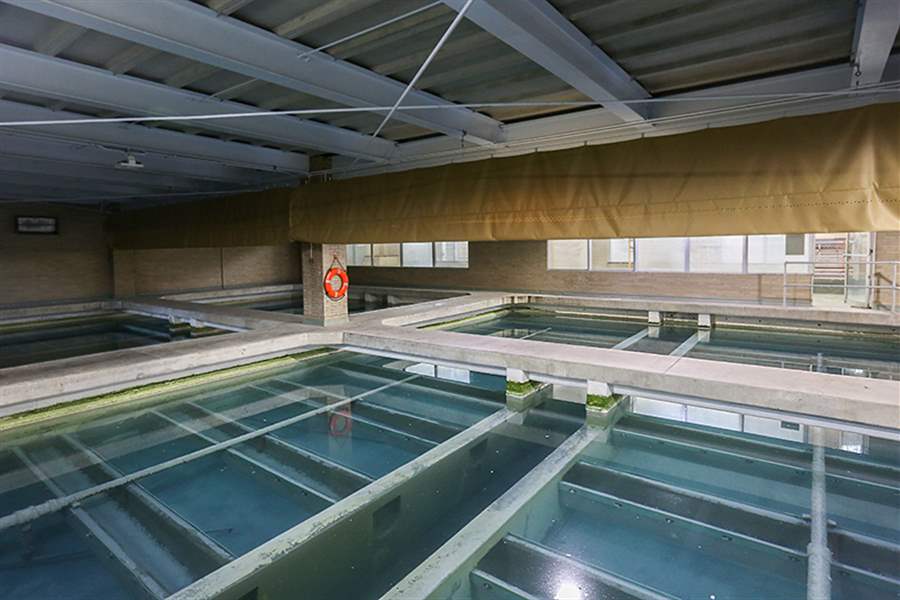
City water customers to keep options open
Suburbs say fair deal or no deal
1/12/2017
Water slowly filters in pools inside the Collins Park Water Treatment Plant in East Toledo. The city of Toledo owns the plant, which would be part of a proposed regional water system.
THE BLADE
Buy This Image
Toledo and its nine water customers may have agreed to move forward with a regional water system, but suburban customers made it clear Wednesday they still may break from Toledo should they not have a fair say in it.
The Toledo Metropolitan Area Council of Governments regional water planning committee met for the first time since Toledo, Maumee, Perrysburg, Sylvania, Fulton County, Lucas County, Monroe County, Whitehouse, Waterville, and the Northwestern Water and Sewer District officials all signed nonbinding agreements supporting regional water.
The next step is determining how to govern such an entity, a balancing act of giving each customer a voice while acknowledging Toledo’s investment — and ownership — of the Collins Park Water Treatment Plant and related infrastructure.
“While we have the greatest risk, we should probably have more control. As our risk diminishes so then, too, should our control,” said Toledo councilman Lindsay Webb, a longtime supporter of a regional water system.
Sylvania Mayor Craig Stough heads the TMACOG committee and has been leading the charge for a regional system since Toledo’s water was fouled by toxic algae and rendered undrinkable for a nearly three-day period in 2014.
The goal of a regional water system is to equalize rates across the board, in part by eliminating surcharges to have each customer paying the same bulk water rate by 2026.
Mayor Stough told committee members he believes they should all strive to have a unified system, but as mayor of Sylvania he will continue to study alternatives as a safeguard for his constituents.
“The city of Sylvania will continue to go down its path studying the formation of its own regional water system, perhaps with other nearby members, and the construction of its own water intake and treatment facility,” he said. “But we’ll do that judiciously so that we do not get past the point of no return. ... I don’t think the city of Sylvania wants to bear the cost or bear the burden of design, construction, and operating of a separate water plant unless it has to.”
Committee members on Wednesday discussed two options for how to legally shape a new system. The first option is to form a regional water board composed of one representative from each customer and two from Toledo, since the city still owns the plant.
The second option, to form a regional water district under state law that would be governed by an appointed board, garnered the most support.
“[That option] does provide a lot of flexibility, and we could have it look like whatever we want it to look like,” said Carol Contrada, a Lucas County commissioner and committee member.
Suburban water customers are wary of forming a regional water board because it is unclear how much governing power Toledo would be willing to relinquish in that scenario.
The nonbinding resolutions approved by Toledo’s nine water customers included language that “gives all participating jurisdictions a meaningful, governing voice in its operation and rates.”
Toledo officials amended their resolution to exclude the meaningful governance phrase.
“Without meaningful governance, there’s no way I could recommend it, and frankly I don’t ever see it passing, from Perrysburg’s perspective,” Perrysburg Mayor Mike Olmstead said. “The best choice is everyone participating, but it’s got to be on a level playing field.”
Ms. Webb said the city of Toledo is considering the move under different circumstances than its customers, mainly because it owns the Collins plant. Should that ownership change, city charter requires a referendum vote from Toledo citizens, she said.
Mayor Olmstead said he understands Toledo’s situation but pushed back on Ms. Webb’s comments Wednesday.
“Those concerns do not trump any other community here that has those same people saying, ‘do what’s right for us,’ ” he said.
Mayor Olmstead added Perrysburg, like Sylvania, is keeping its options open, and the two aren’t alone.
Maumee Mayor Richard Carr and Monroe County drain commissioner David Thompson both said they support exploring a regional water district under state law but are continuing to vet alternatives as well.
“The customers of South County water and the commissioners that represent those individuals are mad as heck,” Mr. Thompson said. “Safety and redundancy are a large priority, but at the end of the day my customers care about fair rates.”
Mayor Stough acknowledged the committee has a lot of work ahead of it, but said he is optimistic all parties will come to an agreement.
“This is very good progress. I can’t tell you how pleased and excited I am, and hopefully your communities are as well,” he said. “To think back to when we first met six months ago, this sort of show of support and progress made would almost have been inconceivable.”
Committee members agreed to schedule an informational meeting ahead of TMACOG’s next committee meeting, set for 7:30 a.m. Feb. 8, to analyze the benefits and drawbacks to forming a water district under state law before making any decisions.
A presentation date has yet to be set but will be posted on tmacog.org.
Contact Sarah Elms at: selms@theblade.com or 419-724-6103 or on Twitter @BySarahElms.